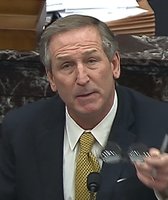Get PolitiFact in your inbox.
You asked, we answered: Our reporters investigated questions from readers about the House impeachment inquiry into President Donald Trump.
In this edition, we answer questions about the House committee hearings, military aid to Ukraine, 2016 election meddling, the relevance of bribery, House Democratic messaging, and the expected Senate trial.
RELATED: PolitiFact's Trump-Ukraine-Biden coverage in one place
Do you have a question? Email us at [email protected], and we’ll try to answer it in our next batch of reader responses. Put "Ask PolitiFact" in the subject line.
Some Trump allies have inaccurately downplayed the assistance Obama gave to Ukraine, at times dismissing it as nothing more than "blankets" (U.S. Rep. Devin Nunes) or "pillows and sheets" (Trump). U.S. Rep. Matt Gaetz said "Obama put a permanent stop on this military aid to the Ukraine" which we rated Mostly False.
In 2014, the Obama administration debated whether to supply lethal Javelin anti-tank missiles, but ultimately rejected Ukraine’s request for lethal aid. U.S. officials were concerned that providing the Javelins to Ukraine would escalate their conflict with Russia.
However, Obama’s White House approved other extensive aid.
In total, between 2014 and 2016, the United States committed more than $600 million in security assistance to Ukraine. Under Obama, the federal government started the Ukraine Security Assistance Initiative, which sent other kinds of U.S. military equipment to the country. From federal fiscal years 2016 to 2019, which overlaps with Obama and Trump, Congress appropriated $850 million.
The Trump administration allowed the sale of the lethal Javelins; however, those weapons are far from the frontlines in Ukraine, suggesting that they are symbolic support only.
The Louisiana Republican mentioned a number of news outlets during his recent interview on Meet the Press, "I think both Russia and Ukraine meddled in the 2016 election," he said.
"It's been well documented in the Financial Times, in Politico, in The Economist, in the Washington Examiner, even on CBS, that the prime minister of Ukraine, the interior minister, the Ukrainian ambassador to the United States, the head of the Ukrainian Anti-Corruption League, all meddled in the election on social media and otherwise," he said.
We found that these articles paint a picture of Ukrainian leaders fearful of Russia and of Trump’s comments that took a more conciliatory stance on Russian aggression. The news coverage shows Ukrainians preferred Hillary Clinton because she was tough on Russia. However, the articles don’t show a vast, top-down approach ordered to boost Clinton.
Kennedy mentioned The Economist multiple times. The Economist’s U.S. editor John Prideaux told us: "We are a bit puzzled by Sen. Kennedy citing us to the effect that Ukraine meddled in the 2016 elections."
Republicans frequently mention a 2017 Politico article, which focused on the work of a Democratic political contractor who tried to dig up dirt on Trump and his advisers. We vetted it and found that the GOP has used its findings selectively.
The Constitution explicitly lists "bribery" as one of the grounds for impeachment — "Treason, Bribery, or other high Crimes and Misdemeanors."
The argument by those in favor of impeachment is that Trump demanded something of value — an investigation into political rival Joe Biden and into a theory that Ukraine rather than Russia meddled in the 2016 elections — corruptly because it personally benefited him in exchange for providing military aid.
Professor Noah Feldman told the House Judiciary Committee that if the House were to determine that getting investigations undertaken was a thing of value to Trump, then the House could safely conclude that the president had committed bribery under the Constitution.
Jonathan Turley, the professor called on behalf of Republicans, disagreed. He argued that Democrats had not proven bribery, saying Trump could have had good reason to withhold aid to Ukraine.
The U.S. Constitution outlines the roles for the House and Senate and prescribes that a two-thirds vote in the Senate for conviction means the person is removed from office.
However the rules and procedures for an impeachment are not written in the Constitution, nor in statute. Instead, they are derived from historical precedent.
The House is likely to vote on articles of impeachment before the end of the year.
Experts have told us that the spirit of the Senate rules on impeachment, written in 1986, express an expectation that the Senate would hold a trial if the House approved impeachment articles.
PolitiFact has never said that Joe Biden didn’t threaten in 2015 to withhold a $1 billion financial aid package if Ukraine’s president didn’t fire his prosecutor general. What we’ve explored is the context behind Biden’s position, action and statements as well as how Biden’s actions differed from President Donald Trump’s delay of aid to Ukraine.
When Biden had his now-famous showdown with former Ukraine President Petro Poroshenko, he was delivering a message not only from the United States, but from the International Monetary Fund and the European Union. All three entities were focused on curtailing corruption in Ukraine and all three were deeply suspicious that Poroshenko’s prosecutor was playing a familiar game of tamping down investigations as a form of political favoritism.
RELATED: Ask PolitiFact: Answers to reader questions about the Trump impeachment inquiry, Hunter Biden
(By all credible accounts, the prosecutor slow-walked the investigation of the energy company that hired Biden’s son, so, if anything, the prosecutor was doing the Bidens a favor. Getting rid of him would do the opposite.)
By contrast, Trump sought a public announcement from Ukraine that it was investigating the Bidens. Trump was pressing for something that fell outside the recommendations of the agencies that helped shape U.S.-Ukraine relations during the Obama administration.
The U.S. Treasury, State and Defense departments, along with the National Security Council, supported the delivery of aid, according to testimony from witnesses Fiona Hill and Alexander Vindman of the White House National Security Council. The agencies were not part of the decision to delay it.
Senate Majority Leader Mitch McConnell, R-Ky., has said that it’s too early to announce how the Senate will handle the expected trial, but law professors say it’s unlikely that a secret ballot rule will be adopted.
A secret ballot would keep voters in the dark as to how their elected officials voted.
Generally, the Senate uses unanimous consent motions or voice votes if it wants to avoid senators having to take a recorded vote. "But those options seem wildly inappropriate for something as consequential as removing the president from office," said political scientist Sam Nelson at the University of Toledo.
Current Senate rules on impeachment stipulate a roll call vote where each senator would be called and respond "guilty" or "not guilty." Each article of impeachment is voted on separately, but the Senate can go into closed session for final deliberation before voting, Nelson said.
U.S. Supreme Court Chief Justice John Roberts will be the presiding officer at the Senate trial and will issue any rulings about the rules, but the Senate can override his rulings by simple majority vote, or choose to change the current Senate rules before a trial begins by simple majority vote, Nelson said.
"I would be stunned if the Senate adopted a secret ballot," said Burdett A. Loomis, a professor emeritus at the University of Kansas. "This might be the most important vote that many of them make their entire career."
McConnell said in November that it was "inconceivable" to him that there would be the required 67 Senate votes to remove Trump from office.
The Democrat-led impeachment inquiry examines whether Trump withheld something of value to Ukraine (a White House visit and military aid) in exchange for something that would benefit Trump personally or politically (announcement of an investigation by Ukraine of his political rival, Biden).
"Quid pro quo," a Latin term for "something for something" or "one thing for another," was frequently used at the beginning of the impeachment inquiry. Democrats are now also using the terms "bribery" and "extortion."
RELATED: Impeachment and bribery: What you need to know
The Washington Post reported that a shift in tone came after the Democratic Congressional Campaign Committee ran focus groups in key House battleground states.
"Among the questions put to participants was whether ‘quid pro quo,’ ‘extortion’ or ‘bribery’ was a more compelling description of Trump’s conduct," the Washington Post reported Nov. 14. The focus groups found "bribery" the most damning, the newspaper reported, citing anonymous sources.
We did not get an on-the-record comment from the DCCC.
The essence of this claim is accurate — but not for the July call at the center of the impeachment inquiry.
The conservative news website Breitbart wrote Nov. 19 that Vindman "admitted he made up elements of President Donald Trump’s call with Ukranian President Volodymyr Zelensky in an official summary." Vindman, a Ukraine policy specialist at the National Security Council, testified in a public impeachment hearing earlier that day about what he heard during Trump’s July 25 call with Zelensky. Vindman has been targeted by disinformation on social media since testifying.
As evidence, Breitbart quoted from an exchange between Vindman and Daniel Goldman, counsel for the Democrat-led House Intelligence Committee, about another call that took place April 21, during which Trump congratulated Zelensky on his election. Goldman questioned Vindman about the White House summary that Vindman wrote about the call.
Goldman: "Col. Vindman, you indicated that you did include in your talking points the idea of Ukraine rooting out corruption but that President Trump did not mention corruption. I want to go to the White House readout from the April 21 call. At the … I’m not going to read the whole thing, but do you see the highlighted portion where it says ‘root out corruption?’
Vindman: "Yes."
Goldman: "In the end, this readout was false. Is that right?"
Vindman: "Maybe that’s a bit of a … It’s not entirely accurate, but I’m not sure if I would describe it as false. It was consistent with U.S. policy, and these items are used as messaging tools also, so a statement that goes out, in addition to reading out the meeting itself, is also a messaging platform to indicate what is important with regards to U.S. policy."
Goldman: "So it is a part of U.S. official policy that Ukraine should root out corruption even if President Trump did not mention it in that April 21 phone call, is that right?"
Vindman: "Certainly."
Goldman: "He also did not mention it in the July 25 phone call, is that right?"
Vindman: "Correct."
Goldman: "Even though it was included in his talking points for the April 21 call, and presumably even though you can’t talk about it for the July 21 (sic) call, it was not included in either. Is that right?"
Vindman: "For the April 21 call-"
Goldman: "You did not mention it in either, rather."
Vindman: "Correct."
Goldman: "When the president says now that he held up security assistance because he was concerned about rooting out corruption in Ukraine, that concern was not expressed in the two phone conversations that he had with President Zelensky earlier this year. Is that right?"
Vindman: "Correct."
So Breitbart’s story contains a hint of truth; Vindman included something in a call summary that was not explicitly discussed between Trump and Zelensky.
But the outlet did not explicitly say which call the summary pertained to, making it look like Vindman "made up" parts of Trump’s phone call with Zelensky in July instead of the April call. Most readers would see the misleading headline and assume the Breitbart story is about the former since it’s the subject of the impeachment inquiry.
RELATED: Fact-checking Trump, Ukraine impeachment hearings, day 1
RELATED: Fact-checking the Trump impeachment hearings: Vindman, Volker, Morrison and Williams
RELATED: Fact-checking the Gordon Sondland impeachment hearing about Trump, Ukraine
Our Sources
Email interview, Sam Nelson, an associate professor and chair of the department of political science and public administration at the University of Toledo, Dec. 5, 2019
Email interview, Burdett A. Loomis, a professor emeritus at the University of Kansas, Dec, 5, 2019
Boston University, BU Today, We Say Quid Pro Quo a Lot. But What Does It Mean?, Oct. 29, 2019
The Washington Post, Democrats sharpen impeachment case, decrying ‘bribery’ as another potential witness emerges linking Trump to Ukraine scandal, Nov. 14, 2019
The New York Times, House Democrats Adopt a Sharper, Simpler Vocabulary, Nov. 18, 2019
C-SPAN, Sen. Mitch McConnell press interview, Nov. 19, 2019
See individual fact-checks for additional sources





































